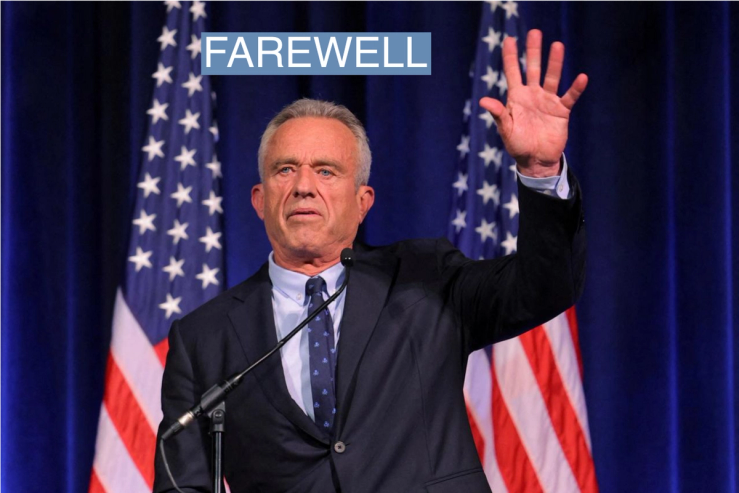The Take
This week marked the official demise of a two-month stretch in which Robert F. Kennedy, Jr. was treated as a relevant candidate worthy of significant national media attention. The cause of death: Significant national media attention. His campaign is survived by several of its favorite podcasts.
Thursday’s House appearance told the story. Kennedy was invited by Republicans probing weaponization of government to testify about online censorship of his vaccine takes. Democrats took the occasion to excoriate him over a video in which he suggested COVID-19 may have been bioengineered to avoid “Ashkenazi Jews and Chinese,” which he denied was antisemitic. Republicans have distanced themselves from the Jewish conspiracy part, but defended his overall value as a truth teller: “It’s why Mr. Kennedy is running for president, it’s to stop — to help us expose and stop — what’s going on,” Rep. Jim Jordan, the chair of the House Judiciary Committee, said.
The scene was the apotheosis of Kennedy’s campaign: Cheered on by Republicans, fought primarily in “anti-woke” and right-leaning media, and generally devoid of any obvious appeal to the Democratic voters it was purportedly meant to sway.
In this article:
Benjy’s view
Kennedy had a brief moment in the sun because he had two superpowers. One, a famous father, which enabled him to soak up just enough support on name ID alone to look credible in early polls. Two, he was an irresistible canvas for every magazine reporter and opinion columnist in America to project their favorite hot take onto.
Do you have 10,000 words of thoughts on the role of conspiracy thinking in American politics? Every writer does! Do you have a hilarious riff about the broader Kennedy clan you’ve been throwing out at parties? Go publish it! Are you a conservative who wants to argue that both sides embrace anti-vaccine cranks? Worth a shot! Would you like to debate the very concept of debates? Go wild! Do you have an angle on how the press covers fringe candidates? I’m giving you one right now!
A similar thing happened with Donald Trump in 2016, who has a magnet for cable segments and thinkpieces alike. But while more coverage of any kind pushed GOP voters towards Trump, Democratic voters began running away as soon as they started learning the first thing about Kennedy’s campaign. And it’s a lot harder to hang a decent column on his candidacy when his base looks like the exact same group of right-leaning conspiracy enthusiasts we already know about.
A Quinnipiac poll this week found Democrats disliked Kennedy by a 2:1 margin, while his numbers were almost perfectly reversed with Republicans. And the picture looked even worse in New Hampshire, where he’s campaigned: A UNH poll found a whopping 69% of Democrats had a negative opinion of him.
As election analyst Jacob Rubashkin noted on Twitter, UNH also asked New Hampshire Democrats to name a word they associated with Kennedy. The results looked like this:

It was fun while it lasted.
Room for Disagreement
Because of a conflict between the DNC and New Hampshire over the primary calendar, Biden’s name might not appear on the ballot — leading to speculation Kennedy might win the state and embarrass the president. The UNH poll mitigated those concerns at least a bit for Democrats, finding 65% of party respondents would still write in Biden’s name, but it’s an unusual situation that could extend his time in the spotlight. He also could generate another round of coverage if he decided to run as an independent given pervasive Democratic fears of a spoiler.
Notable
- To be clear: Many of the RFK, Jr. stories, including the ones referenced in this piece, are great reads. Nor is Semafor above covering his candidacy: Check out David Weigel’s on-the-ground dispatch from Kennedy’s campaign launch and his report on his podcast-focused media strategy. Ben Smith also reported that Kennedy asked Eliot Spitzer about giving paid speeches in office if he ran for attorney general in New York.


